|
Location: Meeting Halls A&B, HQ1-3-430A&B
Gita Gopinath
First Deputy Managing Director
IMF
Gita Gopinath is the First Deputy Managing Director of the International Monetary Fund (IMF). She oversees the work of staff, represents the Fund at multilateral forums, leads the Fund’s work on surveillance and related policies, and oversees research and flagship publications. Ms. Gopinath previously served as the Chief Economist of the Fund. In that role, she helmed thirteen releases of the World Economic Outlook. She co-authored the “Pandemic Paper” on how to end the COVID-19 pandemic that set globally endorsed targets for vaccinating the world and led to the creation of the Multilateral Task Force made up of the leadership of the IMF, World Bank, WTO, and the establishment of a working group with vaccine manufacturers to accelerate delivery of vaccines to low-income countries. She also worked with other Fund departments on a new analytical approach to help countries respond to international capital flows via the Integrated Policy Framework. She also helped set up a Climate Change team inside the IMF to analyze optimal climate mitigation policies. Prior to joining the IMF, Ms. Gopinath was the John Zwaanstra Professor of International Studies and of Economics at Harvard University and before that she was an assistant professor of economics at the University of Chicago’s Booth School of Business. Her research, which focuses on International Finance and Macroeconomics, is widely cited and has been published in many top economics journals. She has authored numerous articles on exchange rates, trade and investment, international financial crises, monetary policy, debt, and emerging market crises.
Panel 1: Improving Resilience of Funding Markets (1 hour, 2:10- 3:10 pm)
Recent crises have exposed vulnerabilities in the liquidity and resilience of various funding markets, particularly short-term funding markets, corporate bond and government bond markets. This session explores the issues that contribute to a lack of liquidity in these markets as well as the potential policy solutions to improve market resilience. The discussion will touch upon all key players in these markets, including issuers, investors, trading venues and intermediaries, as well as their business models.
MODERATOR

Martin Moloney
Secretary General, IOSCO
Martin Moloney joined the International Organization of Securities Commissions (IOSCO) in September 2021 as Secretary General.
Prior to joining IOSCO, Martin was Director General of the Jersey Financial Services Commission (JFSC) and before that he worked as a Special Adviser on Risk and Regulation to the Central Bank of Ireland (CBI), where he served for 16 years, previously heading up the Markets Policy, Markets Supervision, and Legal and Finance Divisions respectively. Prior to joining the CBI, Martin worked for brief periods in the Department of Justice and the Irish Competition Authority, and spent ten years working in the Irish Department of Finance in positions of responsibility in relation to both national and semi-State debt management and the sale of State banks. Martin spent his early career working in Industry at Barclays Bank and the Bank of Ireland in London.
Martin has an LLM in Business Law and a Masters qualification in Economic Policy, both from Trinity College Dublin. He has Postgraduate Diplomas in Arbitration, Regulatory Management and has completed professional examinations of the Chartered Institutes of Bankers and the Chartered Institute of Arbitrators.
PANELISTS

Marie-Anne Barbat-Layani
Chair, Autorité des Marchés Financiers (AMF)
A graduate of the Paris Institut d’Études Politiques and the Ecole Nationale d’Administration, as well as an alumnus of the Master in Politics at New York University, Marie-Anne Barbat-Layani (55 years) has served as a senior civil servant for close to 20 years. She began her career in 1993 at the French Treasury as Deputy to the Secretary General of the Club de Paris and later Deputy to the Head of the Energy, Mines and Telecoms Office of the State Investments Department.
In 1997, she joined the French Permanent Representation Office to the European Union in Brussels as Financial Attaché in charge of competition, state aid and financial services. Three years later, she joined the cabinet of the Minister of the Economy, Finance and Industry as a technical advisor in charge of European Affairs.
From 2000 to 2007, she worked at the Treasury, first as Head of the Office of Credit Institutions and Investment Firms and Secretary General of the National Euro Committee, in the State and Economic Financing Department. She was later appointed Deputy Director of Banks and General Interest Financing.
In 2007, Marie-Anne Barbat-Layani became Deputy CEO of the National Federation of the Crédit Agricole. In 2010, she joined the Office of the Prime Minister as Deputy Director. From 2012 to 2014, she was an Inspector General of Finance and from 2014 to 2019, became Chief Executive Officer of the French Banking Federation and the Association of French Banks.
In 2019, she was appointed General Secretary of the Ministry of the Economy and Finance, where she also served as a Senior Defence and Security Official.
Marie-Anne Barbat-Layani is Chevalier of the Légion d’Honneur and an Officier of the Ordre National du Mérite.

Jay Surti
Division Chief, International Monetary Fund
Jay Surti heads the IMF’s Financial Supervision & Regulation division, holding responsibility for management and execution of the IMF’s work program in these areas, covering policy, surveillance, and capacity development. His previous responsibilities at the IMF include management of the work program on supervision and regulation of NBFI and capital markets; leading the thematic chapters of the Global Financial Stability Report; and as advisor to the IMF’s Financial Counsellor, the coordination of his work program and outreach.
He has participated in several FSAPs, including as the IMF mission chief for the ongoing Spain FSAP and for the 2018 Tanzania FSAP. Jay represents the IMF at the FSB’s Standing Committee on Standards Implementation and has previously been the IMF’s representative at working groups of the FSB and the Basel Committee.
During 2018-20, on leave from the IMF, Jay served as special advisor to the Governor of the Reserve Bank of India, advising top management there on macro-financial stability and financial supervision issues. Jay holds a Ph.D. in economics from Boston University.
 |
Andrew Mogavero
|
Drew Mogavero is Global Head of Credit Products at Barclays and assumed responsibility for this position in November 2021. In this role he has global responsibility for the trading, sales and structuring teams across Flow Credit, Emerging Markets, Special Situations, Structured Credit, Municipal Businesses and Credit Financing. Drew has held a number of leadership roles since joining Barclays in 2008. He led the US High Yield Trading desk, before assuming responsibility for the product globally. He also led the US Credit Derivatives desk before being appointed Head of US Credit Flow Trading in 2014. In 2018 he was appointed Co-Head of US Credit with responsibility for Structured Credit, Municipals and the Financing business and responsibility for the Credit Business’s Technology plan, a role which he held until July 2021 when he was appointed Deputy Head of Credit Products. Based in New York, he is a member of the Global Markets Management Forum and the CIB Risk Committee. Prior to Barclays, Drew was at Lehman Brothers, which he joined in 1999. Drew holds a Bachelor of Science degree in Economics and Public Policy from Duke University.
<
 |
| Joanna Cound Managing Director, BlackRock |
Joanna Cound, Managing Director, is Head of International Government Affairs & Public Policy (GAPP) at BlackRock, and is responsible for the firm’s engagement with policy makers and regulators in Europe, the Middle East, India, Asia Pacific and Latin America. The team helps address financial services policy challenges and bring the voice of the end investor to the table, by delivering data driven thought leadership to policy makers, clients, and industry peers, across the spectrum of financial policy issues impacting savers and investors. She is a member of BlackRock's European Executive Committee, BlackRock's Global Operating Committee and co-chairs the EMEA Corporate Affairs Committee.
Prior to moving to this role, Ms. Cound was International COO for BlackRock's Cash Management Group. Ms. Cound's service with the firm dates to 1996, including her years with Merrill Lynch Investment Managers (MLIM), which merged with BlackRock in 2006. Prior to joining MLIM in 1996, Ms. Cound worked for Fidelity as head of European product development and as a marketing manager for Citibank retail bank in Germany.
Ms. Cound earned a BA degree in European studies from Loughborough University and a masters in European studies from the College of Europe in Bruges, Belgium. She also has an MBA from the London Business School. Ms. Cound is Deputy Chair of the Chatham House Council and member of the Human Resources Committee of Loughborough University.
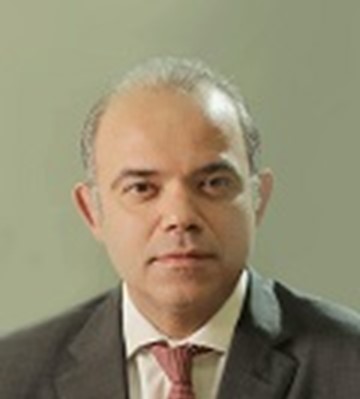 |
Mohamed Farid Saleh
|
Dr. Mohamed Farid Saleh, Chairman of the Financial Regulatory Authority, Egypt
Dr. Mohamed Farid Saleh was appointed as Chairman of the Financial Regulatory Authority (FRA) in August 2022 as per the Presidential Decree No. 353/2022. He is a Board Member at the Central Bank of Egypt (CBE) and a Member of the CBE’s Monetary Policy Committee (MPC). Dr. Faid is currently the Vice Chair of the Advisory Board for the GFANZ Africa Network where global and regional leaders across public and private sectors in Africa provide strategic guidance and expertise-driven feedback in order to help broaden, deepen and raise climate ambition and accelerate climate action in the financial sector in Africa. He is also a member of the High-level Expert Group for the United Nations Economic Commission for Africa (UNECA) on Scaling up investment and finance to deliver on climate ambition and development goals supported by the COP26 Presidency and incoming COP27 Presidency.
Farid became the Executive Chairman of the Egyptian Exchange (EGX) in August 2017 as per the Prime Ministerial Decree No. 1759/2017, and his term was renewed in August 2021. During this period, Farid held many significant international positions; the Chairman of the Federation of Euro-Asian Stock Exchanges (FEAS) from 2017 to2019 and from 2021 till August 2022; the Chairman of the Arab Federation of Capital Markets (AFCM) from 2019 till 2021; the Chairman of the Emerging Markets Working Group at the World Federation of Exchanges (WFE) from 2017 till 2021; a Board Member of the African Securities Exchanges Association (ASEA) throughout his Chairmanship of the EGX. He also served as a board member in Misr for Central Clearing, Depository and Registry (MCDR) and the Egyptian Investor Protection Fund (IPF). Prior to his appointment as EGX Executive Chairman, Farid served as the Chairman and the CEO of Dcode EFC - a leading economic advisory firm in Egypt.
Furthermore, between 2013 and 2016, Farid was an External Consultant on Venture Capital (VC) and Financial Leasing for the World Bank Group in Egypt and was a Member of the Capital Market Advisory Committee established by the Financial Regulatory Authority (FRA). Additionally, he served as the Vice Chairman of the EGX in 2010-2011. He also served as a part-time lecturer in Financial Markets, International Finance, and Financial Derivatives at the American University in Cairo (AUC) and at the Arab Academy for Science, Technology & Maritime Transport (AASTMT).
Farid holds a PhD in Financial Economics from Cardiff Metropolitan University - UK, an MSc in Quantitative Finance from Bayes Business School - City, University of London, an MSc in Economics, (Project Analysis, Finance & Investment) from York University - UK, and an MBA from the Arab Academy for Science, Technology & Maritime Transport (ASST) - Egypt. He also holds a certificate in Venture Capital from UC Berkley - the United States of America, a certificate in Time-Series Analysis from Timberlakes, Cambridge University - UK, and a BSc in Foreign Trade and Economics from Helwan University - Egypt.ersity.
Panel 2: Rising Significance of Private Funds (1 hour, 3:10 - 4:10 p.m.)
Private funds have grown significantly over the last decade, particularly as banks have pulled back post the 2008 crisis and investors have searched for yield in the low interest environment. Current estimates put the rise of the sector in excess of 11 trillion dollars . Private credit assets alone grew to approximately $ 2.1 trillion globally in combined assets and undeployed capital commitments in 2023, as outlined in the recent GFSR. The rapid growth of this sector, its close interconnectedness with the insurance and pension sectors, its linkages to corporate indebtedness, and the sectors potential vulnerability to a high rate environment may all have implications for financial stability. This discussion will focus on risks emerging from private funds as well as on what a potential toolkit could look like for policymakers to address potential financial stability concerns.
MODERATOR
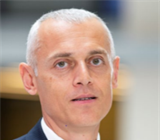 |
| Fabio Natalucci Deputy Director of Monetary & Capital Markets Department, IMF |
Fabio M. Natalucci is a Deputy Director of the Monetary and Capital Markets Department with responsibility for the IMF’s global financial markets monitoring and systemic risk assessment functions. He oversees the Global Financial Stability Report that gives the IMF’s assessment of global financial stability risks. He is also responsible for monitoring and evaluating risks and opportunities in sustainable finance markets.
Prior to joining the IMF, Fabio was a Senior Associate Director in the Division of Monetary Affairs at the Federal Reserve Board, where he conducted research and current analysis on the relationship between monetary policy, financial regulatory policy, and financial stability. Between October 2016 and June 2017, Mr. Natalucci was Deputy Assistant Secretary for International Financial Stability and Regulation at the U.S. Department of Treasury. His responsibilities included leading U.S. engagement on financial regulatory cooperation in the G-20, representing the U.S. Treasury at the Financial Stability Board, coordinating between domestic and international post-crisis regulatory reforms, and monitoring developments and vulnerabilities in global financial markets. Fabio holds a PhD in Economics from New York University.
PANELISTS
 |
| Nikhil Rathi CEO, UK Financial Conduct Authority (FCA) |
Nikhil was appointed Chief Executive of the FCA on 1 October 2020. He began his career in HM Treasury before serving as Private Secretary to the Prime Minister between 2005 – 2008. Nikhil then became Head of the Financial Stability Unit, overseeing a number of the UK’s financial stability interventions before becoming HM Treasury’s Director of the Financial Services Group from 2009 – 2014. In that role, he also served as the UK representative to the EU Financial Services Committee. Nikhil joined the London Stock Exchange (LSE) in 2014, and was appointed CEO in 2015. Nikhil holds a BA in philosophy, politics and economics from the University of Oxford.
 |
| Paul Horvath CEO, Orchard Global |
Chief Executive Officer & Co-Founder of Orchard Global Orchard Global provides lending and risk-transfer solutions across a range of private and public markets strategies. Orchard manages capital on behalf of pensions, sovereigns, endowments, hospitals, educational institutions, families, and many others around the world; offering private credit and public credit strategies by leveraging complex structuring capabilities, an in-house legal team, comprehensive credit expertise, and global reach.
Prior to co-founding Orchard Global, Horvath held leadership roles in credit, structured credit, alternative assets, and derivatives at J.P Morgan and Merrill Lynch from 1994 to 2008. During his time at JPM, he helped create and grow the Credit Derivatives, Credit Correlation, Structured Credit and Bank Regulatory Capital Relief markets, helping banks manage the capital exposure through repeated economic downturns.
While at Merrill, he helped to create non-dollar high yield, the non-dollar ABS, the Trust Preferred and the Alternative Tier One capital markets in Europe and America. Further, Horvath held positions at the Federal Reserve Bank of New York and Bear Stearns, where he monitored the Mortgaged-Backed Securities sector as well as the Bank and Thrift industry. While starting his educational career in D.C. and spending substantial time there with his family throughout his professional career, Horvath has built longstanding relationships in U.S. Politics. Viewed as a financial thought leader, he is often in touch with key Congressmen and Representatives during fiscal policy initiatives, elections, and global developments. Horvath maintains close contacts on both sides of the aisle including: current and former Speakers of the House, Senate Majority and Minority Leaders, Treasury Officials, and former U.S. Presidents. Additionally, Horvath maintains a strong commitment to the North Atlantic Alliance through his participation in the Munich Security Conference and relationship with Bundestag Members and European Finance Ministers.
Boards/Philanthropy:
Trustee of the Washington National Cathedral and has served on and chaired the Investment Committees of the WNC and the National Cathedral School Endowments Investment Committee Chair of the Protestant Episcopalian Cathedral Foundation Founding Board Member and Treasurer of American Friends of the Munich Security Conference Presidents Council Member of the National Constitution Center Trustee of the Georgia O’Keefe Museum serving on the Finance and Investment Committees Horvath isthe Chairman of the Board of the Hungarian American Institute, on the Board of Regents of Georgetown University and serves on Johns Hopkins Joint Krieger Advisory Board Executive Committee & Physics and Astronomy Council
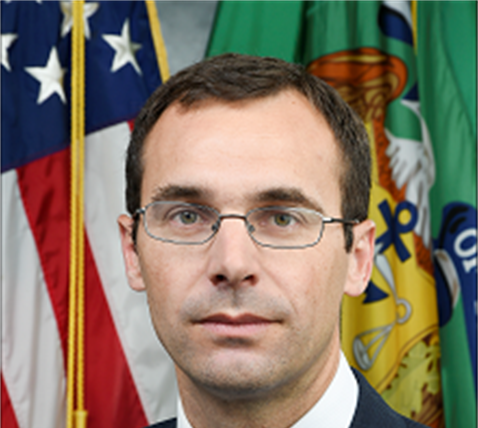 |
Steven Seitz, Director US Federal Insurance Office |
Steven E. Seitz is the Director of the Federal Insurance Office (FIO) in the U.S. Department of the Treasury. FIO monitors all aspects of the insurance industry and develops federal policy on prudential aspects of international insurance matters, including representing the United States at the International Association of Insurance Supervisors (IAIS). FIO also administers the Terrorism Risk Insurance Program. FIO is also authorized to collect and disseminate data and information from the insurance industry. Steven is a non-voting member of the Financial Stability Oversight Council. At the IAIS, Steven is a member of the Executive Committee and serves as Vice Chair of the Macroprudential Committee. Steven also represents FIO at the Sustainable Insurance Forum.Steven previously served as the Deputy Director of FIO. Prior to joining FIO, Steven worked in Treasury’s Office of the Assistant General Counsel (Banking and Finance). Previously, Steven served as Counsel in the Office of the General Counsel at the Commodity Futures Trading Commission. Steven holds a B.A. from Cornell University and a J.D. from The University of Chicago Law School.
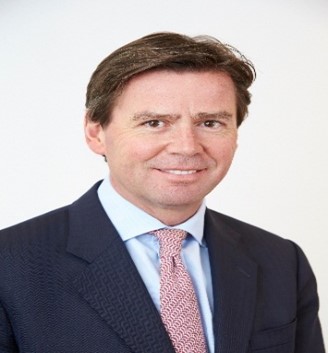
|
| Jack Inglis, CEO Alternative Investment Management Association |
Jack Inglis is the Chief Executive Officer of the Alternative Investment Management Association (AIMA), a position he has held since 2014. He has been in the financial services industry and closely involved with hedge funds for over 40 years. Jack has held senior management positions at both Morgan Stanley, where he served for 16 years, and Barclays, where he was prior to joining AIMA. From 2007 to 2010 he was CEO of London based hedge fund manager, Ferox Capital Management. He served as a non-executive director of London Capital Group plc from 2007 to 2010 and was on the on the board of the Chartered Alternative Investment Analyst Association (CAIA), which was co-founded by AIMA, until the end of 2023. He began his career in 1983 at UK stockbrokers James Capel (which was subsequently acquired by HSBC) and has extensive experience in origination, distribution, financing and trading across the fixed income and equity capital markets. Jack is also Chair of the charity HFC Help for Children UK Affiliate Board and took up this role in January 2020. Jack holds a Master of Arts in Economics from Cambridge University. in Economics from Cambridge University
HIGH LEVEL POLICY PANEL
Evolving Interactions between Central Banks and Securities Market Regulators (1 hour, 4:40 - 5:40 p.m.)
As nonbanks are rapidly growing in size, and the lines between banks and nonbanks are blurring, active and close cooperation between Central Banks and Securities Regulators is more important than ever. In this policy panel, we engage Central Bankers, Securities Regulators and other key stakeholders as they explore the complex interplay of their roles in today’s highly interconnected financial system.
MODERATOR
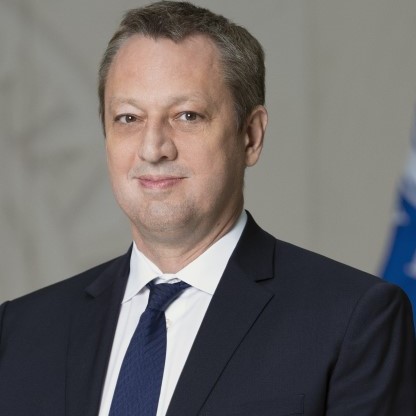
Tobias Adrian
Financial Counsellor and Director of Monetary & Capital Markets Department, IMF
Tobias Adrian is the Financial Counsellor and Director of the Monetary and Capital Markets Department of the International Monetary Fund (IMF). In this capacity, he leads the IMF’s work on financial sector surveillance, monetary and macroprudential policies, digital money, financial regulation, bank resolution, debt management, capital markets, and climate finance.
He also oversees capacity building activities in IMF member countries with regard to the supervision and regulation of financial systems, bank resolution, central banking, monetary and exchange rate regimes, central bank digital currency, and debt management.
Prior to joining the IMF, Mr. Adrian was a Senior Vice President of the Federal Reserve Bank of New York and the Associate Director of the Research and Statistics Group. At the Federal Reserve, he contributed to monetary policy, financial stability policies, and to crisis management. Mr. Adrian has published extensively in economics and finance journals. His research spans macro-finance, monetary policy, financial stability, and climate finance, with a focus on aggregate consequences of capital markets developments.
He has taught at Princeton University and New York University. He is member of the editorial boards of the International Journal of Central Banking and the Annual Review of Financial Economics. Mr. Adrian holds a Ph.D. from the Massachusetts Institute of Technology in Economics, an MSc from the London School of Economics in Econometrics and Mathematical Economics, a Diplom from Goethe University Frankfurt and a Maîtrise from Dauphine University Paris. He received his Abitur in Literature and Mathematics from Humboldtschule Bad Homburg.
PANELISTS

|
| Jean-Paul Servais Chairman of the Board, IOSCO |
Jean-Paul Servais is the Chairman of the IOSCO Board. He is also Chairman of the IOSCO European Regional Committee, Chair of the IFRS Foundation Monitoring Board, and co-Chair of the Monitoring Group in charge of the public governance of the audit standard setting at international level.
Mr. Servais is the Chairman of the Belgian Financial Services and Markets Authority (FSMA) and a board member of several international supervisory bodies for the financial sector such as ESMA and the ESRB. He sits on a number of supervisory colleges that coordinate the (cross-border) supervision of several financial institutions and infrastructures.He teaches at the Université Libre de Bruxelles (ULB, University of Brussels), where he is part-time professor in International Business Law and in the specialized Master in Tax Law
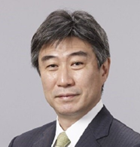
|
| Shigeru Ariizumi Vice Minister for International affairs, Japan FSA |
Ariizumi Shigeru is Vice Minister for International Affairs of the Japan Financial
Services Agency (JFSA). He plays leading roles in various international fora. He is a member of the FSB Plenary and also serves as Chair of the Executive Committee of the IAIS, as well as the Vice Chair of the Board of IOSCO. Before assuming his position in July 2023, he held key positions at the Japanese Ministry of Finance (JMOF) and the JFSA. At the JMOF, he worked as G7/G20 Deputies Deputy in the Finance Track and also supervised Japan’s relationship with the IMF and the World Bank. At the JFSA, he led the team under Japan’s G20 Presidency in 2019. He also has extensive experience in supervision, holding senior management positions in all banking, securities and insurance. He holds a Bachelor degree in law from the University of Tokyo and a Master degree from Harvard Law School. He has passed the bar in Japan and the United States and is a registered attorney in the State of New York.
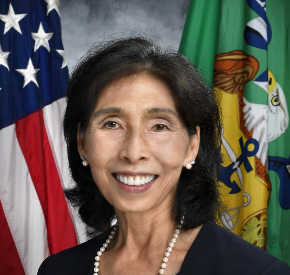 |
| Nellie Liang Chair, FSB SCAV and Under Secretary, U.S. Treasury |
Nellie Liang was confirmed as the Under Secretary for Domestic Finance at the U.S. Department of the Treasury in July 2021. She also currently is the Chair of the Standing Committee on Assessment of Vulnerabilities, Financial Stability Board. Prior to serving at Treasury, Liang was a Senior Fellow in Economic Studies at the Brookings Institution. She also was a Visiting Scholar at the International Monetary Fund’s Monetary and Capital Markets Department, Lecturer at the Yale School of Management, and a member of the Congressional Budget Office’s Panel of Economic Advisors. Over three decades at the Board of Governors of the Federal Reserve System, Liang held a range of positions, including as the first Director of the Division of Financial Stability from 2010 to 2017. In that position, she oversaw the development of financial stability policies related to risks in financial firms and financial markets, and interactions of financial policies with monetary policy. Her recent research has focused on the financial system and macroeconomic growth. Liang received a Ph.D. in economics from the University of Maryland and a B.A. in economics from the University of Notre Dame.
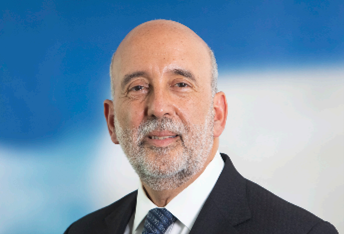
|
| Gabriel Makhlouf Governor, Central Bank of Ireland |
Gabriel Makhlouf took up his position as Governor of the Central Bank of Ireland on 1 September 2019. He chairs the Central Bank Commission, is a member of the Governing Council of the European Central Bank, a member of the European Systemic Risk Board, and is Ireland's Alternate Governor at the International Monetary Fund. As Governor, Gabriel leads an organisation that is responsible for monetary and financial stability, prudential regulation and financial conduct. Before joining the Central Bank, he was Secretary to the New Zealand Treasury from 2011 to 2019. During his time as Secretary, he led reviews of New Zealand's three macroeconomic pillars (monetary, financial stability and fiscal policy) and the development of a new framework for economic and public policy focused on intergenerational wellbeing (and including the concept of social, natural, human and financial/physical capitals). His current interests include the role of central banks in building social capital and the need for macroeconomics to increase its focus on longer-term
intergenerational issues.Gabriel has also worked in the UK Civil Service where his roles ranged from policy on tax and welfare issues through to large-scale operational delivery. He was responsible for the UK's
Government Banking Service and has also chaired the OECD's Committee on Fiscal Affairs.Gabriel has degrees from the Universities of Exeter and Bath, and is an alumnus of INSEAD Business School.
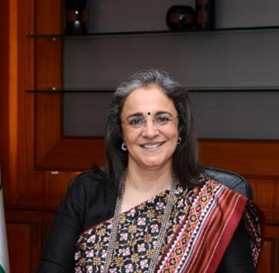
|
| Madhabi Puri Buch Chair, Securities and Exchange Board of India |
Ms. Madhabi Puri Buch assumed office as Chairperson of Securities & Exchange Board of India (SEBI) with effect from March 2, 2022. Ms. Buch has served as Whole Time Member, SEBI till October 04, 2021. She has handled Market Regulation Department, Market Intermediaries Regulation & Supervision Department, Integrated Surveillance Department, Investment Management Department, Department of Economic & Policy Analysis, Office of Investor Assistance & Education, National Institute of Securities Markets and Information Technology Department. Ms. Buch has also served as a Consultant to the New Development Bank in Shanghai. Ms. Buch also served as the Head of the Singapore office of the Private Equity Firm, Greater Pacific Capital. She also served as the Managing Director and Chief Executive Officer at ICICI Securities Limited and as Executive Director, on the Board of ICICI Bank. Ms. Buch also served as a non-executive director on the Boards of various companies. Ms. Buch holds an M.B.A. from the Indian Institute of Management, Ahmedabad and is a Graduate in Mathematics from St. Stephen's College, New Delhi
SUMMARY OF THE CONFERENCE (5 min; 5:40 – 5:45 p.m.)
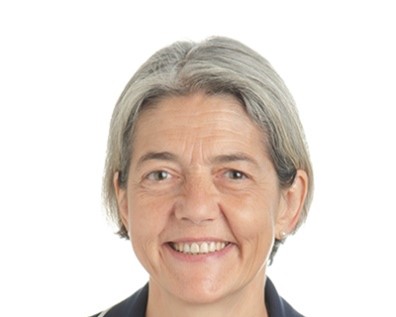 |
| Marina Moretti Deputy Director, International Monetary Fund |
Marina Moretti is Deputy Director in the Monetary and Capital Markets Department of the International Monetary Fund (IMF). In this capacity, she oversees the policy and technical work on financial supervision and regulation as well as on financial crisis preparedness and management. She has extensive experience across several aspects of financial stability and has published on financial crises; bank and corporate restructuring; regulatory reforms; and systemic risk analysis. In her IMF career, she has worked with member countries to promote financial soundness; has been closely involved with various international regulatory reform initiatives (including as a member of the Financial Stability Board secretariat in 2008–10); and currently represents the IMF on the Basel Committee on Banking Supervision (BCBS). Prior to joining the IMF, she held positions with the World Bank, including its Special Financial Operations Unit (the Bank’s crisis management arm during the Asian crisis); and with the Organisation for Economic Co-operation and Development (OECD).